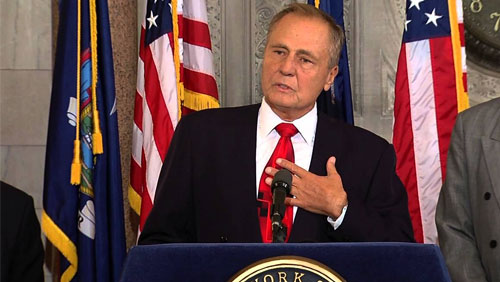A key state senator has introduced a new bill on Wednesday, six weeks after the New York State Senate held a hearing on how the state should best pursue a legal sports betting market.
 Sen. John Bonacic, chairman of the Committee on Racing, Gaming and Wagering, filed Senate Bill S7900, which seeks to legalize single gaming wagering in New York in the event that the U.S. Supreme Court chooses to overturn the federal sports betting prohibition.
Sen. John Bonacic, chairman of the Committee on Racing, Gaming and Wagering, filed Senate Bill S7900, which seeks to legalize single gaming wagering in New York in the event that the U.S. Supreme Court chooses to overturn the federal sports betting prohibition.
S7900, the contents of which can be seen here, may be the most serious attempt to legalize sports betting in the state yet—but it’s also designed to negotiate a compromise between professional sports leagues and gaming interests in New York.
Who runs the show?
In 2013, New York executed a state constitutional amendment allowing sports betting at four commercial casinos, although this authorization doesn’t apply to state racetracks, racinos, tribal casinos or off-track betting parlors.
Under S7900, however, tracks and off-track betting parlors will also be allowed to take sports wagers. The bill seeks to empower the New York State Gaming Commission to manage the sports betting licenses and also be responsible for the implementation of the law. Gaming entities will be required to secure a separate sportsbook license on top of any other license needed to operate a gaming facility in the state.
S7900 also proposes a state tax rate of 8.5% on gross gaming revenue, plus a 0.25% “integrity fee” payable to the sports leagues. The integrity fee is capped at 2% of a casino’s sports wagering gross revenue, due every three months. Depending on a sportsbook’s quarterly performance, the effective rate could reach 10.5%, although casino operators are shielded from paying the integrity fee in the event of a loss.
The 0.25% fee is lower than the 1% cut of all sports betting handles that the NBA and the MLB have been demanding, although the New York state will cede to other league requests, including getting the final say on where the sports betting data can come from.
S7900 proposes that operators will be required to use the official data of sports leagues for in-play wagers, referred to as Tier 2 wagers in the bill. For Tier 3 bets, which includes teasers, parlays, second-half or first-half wagers, and futures bets, the leagues can request the commission to have the operators use its official data.
Leagues like the NCAA and NFL, which historically have been against legal sports betting, will also be given the right to “notify the commission that it desires to restrict, limit, or exclude wagering on its sporting events by providing notice in the form and manner as the commission may require.”
In an interview with Gambling Compliance, Bonacic is confident that “we’ve done a decent job with appeasing everybody,” even though it’s “quite challenging” to balance the interest of all parties involved.